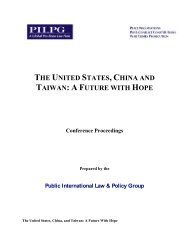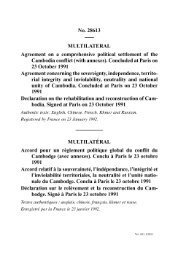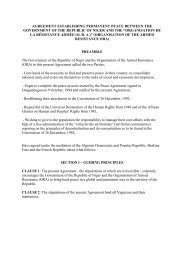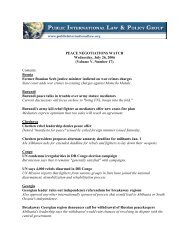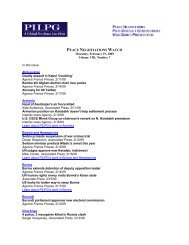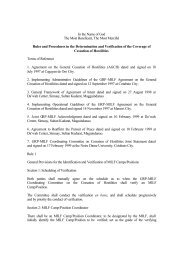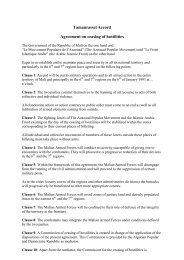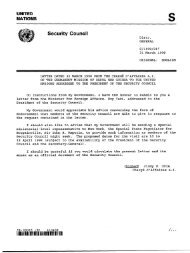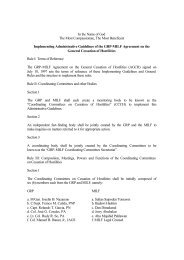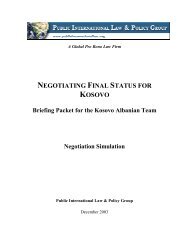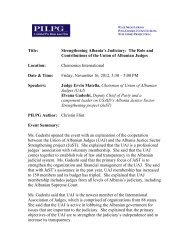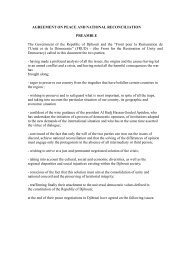Create successful ePaper yourself
Turn your PDF publications into a flip-book with our unique Google optimized e-Paper software.
6<br />
the Serbs to take control of Kosovo's political and economic and social institutions, often<br />
riding roughshod over Rugova's LDK in the process. Also driving the crisis was concern<br />
within the LDK hierarchy that if he won the Presidency by sacrificing an LDK Prime<br />
Minister, Rugova—an aloof figure notorious for ignoring the advice and the interests of<br />
his LDK subordinates—might cast the LDK adrift.<br />
In meetings with me both Rugova and Thaci denied that personalities played any role in<br />
the crisis but their words and demeanor showed the opposite. Rugova refused even to<br />
mention Thaci by name, referring instead to "that guy" and saying that if Thaci were<br />
allowed to become Prime Minister there would be a repetition of the problems in 1999<br />
under the "so-called" Provisional Government." Thaci, for his part, told me he did not<br />
hate Rugova but that he did not owe him anything either. Thaci also said he did not<br />
believe Rugova could be trusted to represent Kosovo's interests with sufficient vigor in<br />
discussions over Kosovo's future.<br />
Maneuvering over the government crisis exposed some of the seamy side of Kosovo<br />
politics. Although the November 2001 campaign was relatively violence-free, shortly<br />
after the election a prominent LDK figure was shot and killed. Although UN police<br />
announced that the shooting was not political, many Kosovo Albanians believe that it did,<br />
in fact, stem from political motives intended to intimidate LDK supporters.<br />
Representatives of the ten, non-Serb minority representatives are widely reported to have<br />
been intimidated against voting for Rugova, which would have brought him to the verge<br />
of victory. Rugova told me that he had not pressed the non-Serb minorities to vote for<br />
him because he knew that would be dangerous for them. Former Kosovo Communist<br />
chief Azem Vllasi, whose wife is a Bosnian Moslem and who has close ties to the non-<br />
Serb Kosovo minorities, told me he was aware of threats aimed at minority deputies and<br />
that he believed these stemmed from PDK sources.<br />
Why the crisis led Ramush Haradinaj to throw in his lot with Thaci and the PDK is<br />
unclear. Rugova told me that he had unsuccessfully sought Haradinaj's support for the<br />
presidential vote but that he believed Haradinaj and Thaci were essentially operating as<br />
one party group. Haradinaj, for his part, told me that he had not supported Rugova<br />
because he believed Kosovo should have a united leadership that included the leaders of<br />
all three major parties.<br />
Neither Rugova nor Thaci sought the support of the Kosovo Serb "Povratak" coalition,<br />
whose 22 deputies could have given the president's post to Rugova. The U.S. office<br />
apparently attempted to persuade the Serbs to vote for Rugova but this effort failed,<br />
although the "Povratak" leader, Rada Trajkovic, was evidently tempted. The number two<br />
in "Povratak," Oliver Ivanovic, described the U.S. offer as vague, called Trajkovic a U.S.<br />
puppet for considering it, and said that Serbs would have voted for either Albanian<br />
faction provided they would have offered a written guarantee that all Serbs would have<br />
security, freedom of movement, and the right to return to their homes—a proposal<br />
obviously designed to be rejected. Trajkovic, for her part, told me that after the



